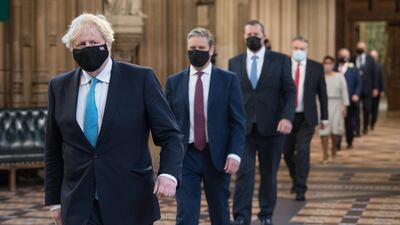The British government's ambition to expand its post-Brexit free trade portfolio is now crystal clear. The UK would, Queen Elizabeth's speech on Tuesday made clear, rapidly "deepen trade ties" with the Gulf and much of the globe.
The explicit mention of the Middle East and other regions plays into the government plans to make Britain a free-trading power ready to strike deals across the globe.
This is not driven only by aspirations of Global Britain but by the necessity to find markets for goods to replace the EU as the major trading partner that accounted for 43 per cent of UK exports.
Under Britain’s burgeoning mercantile approach, it has already signed 67 trade deals and launched negotiations for many others, including in the Gulf.
The prospects of a deal are high, with Downing Street briefing journalists that it would “foster thriving relationships in the Middle East” based on trade, green innovation, science and trade.
The government said “Global Britain is a fierce champion of free and fair trade” that would “forge closer links with fast-growing and like-minded nations”.
Global trade is another necessity – Britain needs the money. The government's major departure from traditional Conservative orthodoxy is underlined by its borrowing and spending on a scale not seen since the Second World War. This was driven by the pandemic but at some point Britain will need to recoup the £300 billion ($424.74bn) it borrowed to get through the past year.
Now freed from EU regulations and imbued with growing confidence, Prime Minister Boris Johnson aims to move fast in striking agreements that are mutually beneficial for Britain and its new trading partners.
Free trade agreements, it is hoped, will account for 80 per cent of total UK commerce within three years.
Much of that commercial drive will come through the eight new freeports announced by the queen, designed to drive exports and create jobs. Goods arriving at the freeports, strategically placed around the country – and including an airport in the East Midlands – are not subject to tariffs. This works well for exports as taxes are only paid if the goods are moved within the UK, otherwise they are sent overseas untaxed.
This new-found nimbleness has been helped along by the successful vaccination programme, that not only instilled Britain with belief but perhaps demonstrated that the EU’s approach was too lumbering for the island nation.
The prospect of a trade deal with the UAE was looked on favourably by the Emirates' ambassador in London.
"Following the queen's speech, the UAE welcomes the UK's commitment to deepen trade ties with the Gulf region," His Excellency Mansoor Abulhoul said. "Our countries already have strong business connections, with the UAE continuing to be the UK's top Arab trading partner and more than 5,000 British businesses operating in the Emirates. We are proud that so many Britons already choose to export to the UAE and have a presence in the Emirates as a gateway to the wider Gulf region."
He said the countries already collaborated across several sectors from energy to financial services, highlighted by an £800 million investment from the UAE into UK life sciences. "We hope to build on this foundation to the benefit of both countries as we all look to deliver economic prosperity in the aftermath of the Covid-19 pandemic," the ambassador said.
Tuesday also proved that for the first time in 40 years the British Parliament could make legislation without looking over its shoulder at EU regulations. It is unclear whether this proves positive or negative, but the government is proposing a long list of legislation.
For the last decade, the Conservative-led government has pushed the green agenda with ambitious but achievable targets of reducing carbon emissions. With the arguments that this would be detrimental to growth proven wrong, Mr Johnson hopes to generate 250,000 jobs with his Ten Point Plan for a green industrial revolution.
Prioritising climate change is not only necessary, but also brings political benefits. Mr Johnson’s previously tepid relationship with US President Joe Biden is warming over climate change, with the American leader a major environmental enthusiast. The relationship will likely be further enhanced when Britain hosts the Cop26 climate summit in November.
As someone who came close to death during the pandemic, Mr Johnson knows better than most the importance of the National Health Service. He understands, too, that the NHS and its workforce are held dear by the British public. But the system is in need of reform and is inferior to major European nations in terms of capability and capacity.
In the immediate term, the government needs to address the significant backlog of cancer patients, perhaps as many as one million as reported by The National on Monday, that have built up during the Covid crisis.
“We must also account for the returning demand of those people who have not come forward for care during the pandemic,” Downing Street said as part of its NHS Catch-up and Recovery Plan.
Alongside trade, environment and health bills, the queen announced a raft of legislation from policing to immigration and electoral reform. With an 80-plus majority of MPs, much of the government agenda will sail through Parliament.
Newly confident from deal-making and having stolen a march on the coronavirus, it appears the country is potentially emerging from a half-decade of torpor into the “sunlit uplands” that many had only thought of as one of Mr Johnson's elegiac ramblings.


